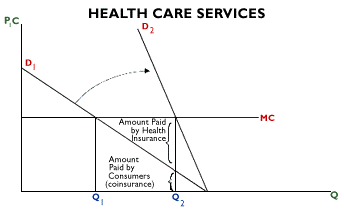
Overview
The health care industry has undergone dramatic change over the past 25 years. Two forces in particular—the rapid growth of managed care and government efforts to reduce the growth of health care expenditures—have contributed substantially to the changing nature of health care markets. Managed care plans have attempted to control health care costs by affecting patterns of health care delivery. The federal government’s prospective payment system for Medicare has also altered the delivery of services to some of the most intensive users of the health care system.
Many providers have engaged in mergers and vertical agreements in response to cost containment pressure from health insurers and government payers. Hospital care in particular has been affected by payors’ efforts to reduce costs. Hospitalization of patients has declined dramatically, leading to lower hospital censuses and reduced average lengths of stay. At the same time, outpatient hospital service, ambulatory surgery centers, home health care providers and the like have experienced rapid growth. As a result, the hospital sector has undergone extensive consolidation as hospitals bid for managed care contracts and try to operate more efficiently.
Relationships among different types of providers have also changed markedly. Hospitals and physicians have joined forces through physician-hospital organizations. In addition, many independent physicians and physician groups have merged or have joined together to compete for business from managed care companies.
The health care insurance industry has also evolved with the rapid growth in managed care despite some retrenchment regarding network openness. HMO and PPO plans have attracted a significant share of the insured population, many of whom have switched from traditional indemnity plans. In response, many of the traditional plans have begun to offer managed care options. These changes have spurred significant consolidation in the health insurance industry.
The transformation of the health care industry has raised a number of interesting and difficult antitrust issues stemming from consolidation as well as conflict among market participants. Timely analysis of these issues requires microeconomic skills and solid institutional knowledge of the health care industry.
Secretariat Economists professionals have broad experience in health care antitrust and regulation. While serving in government, they helped shape health care antitrust policy, including the statements of policy enforcement for health care issued by the Department of Justice and Federal Trade Commission. They have also provided support for antitrust investigations and litigation.
Experience
Secretariat Economists’ involvement in the analysis of these matters has included assistance in litigation, presentations to state and federal regulatory authorities, testimony at trial, and a wide range of support for the completion of transactions or litigation including empirical analyses and collection and development of necessary data.
Secretariat Economists professionals have analyzed issues like the following:
- Competitive effects of mergers and joint ventures among general acute care hospitals, psychiatric hospitals, and hospital chains
- Joint bidding arrangements among hospitals for managed care contracts
- Vertical arrangements between hospitals and physicians and the competitive effects of physician networks
- Competitive effects of the denial of staff privileges to hospital-based and non-hospital-based physicians
- Competition between Blue Cross and for-profit health insurers
- Competition in the market for nursing services
- Mergers of home health care providers
- Competitive effects of health care coalitions and business purchasing groups
- Mergers or transactions involving HMOs and PPOs and the effects of PPO and HMO formation on the price and quality of health care
- Competitive implications of provider-controlled PPOs
- Vertical integration of health insurers and healthcare providers
- Mergers of pharmaceutical companies
- Competition in the hospital supply industry
- Competitive effects of state regulation of certificates-of-need
- Competitive effects of regulatory changes by the Health Care Financing Administration
